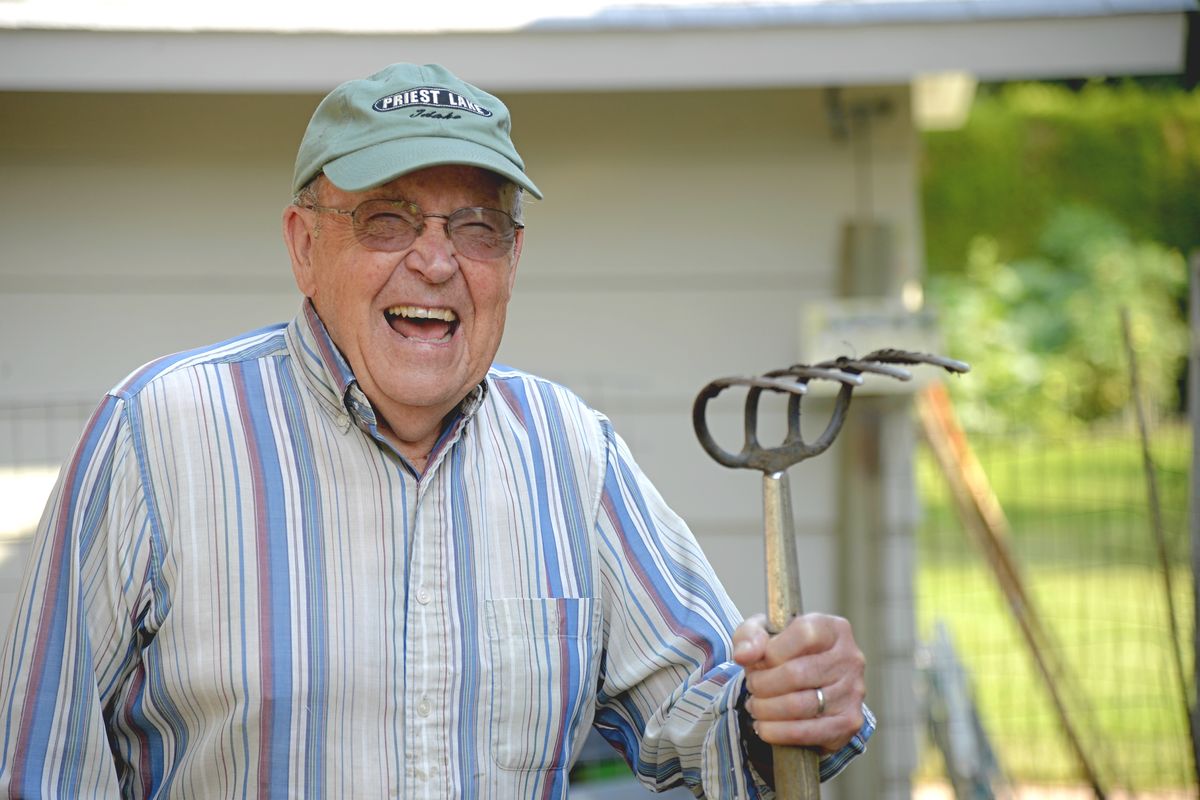This column reflects the opinion of the writer. Learn about the differences between a news story and an opinion column.
Doug Clark: Tales of vegetation, devastation
Eighty-eight-year-old Spokane Valley resident Bill Palmer, pictured Wednesday, loves to compost by gathering coffee grounds, twigs and yard waste, adding horse manure and turning the pile often to create the perfect garden magic. (Jesse Tinsley)Buy a print of this photo
An 88-year-old Spokane Valley resident wanted to “pass the torch” regarding some magic compost recipe he uses to make his flower and vegetable gardens magnificent year after year.
Yeah. I get a lot of weird phone calls.
I tried to explain that while I appreciated the honor (not to mention his faithful readership), I wasn’t the gardening disciple he thought I could be.
All I want to know about agriculture can be found in the produce aisles at Safeway or Rosauers.
But Bill Palmer wasn’t about to cease or desist.
He kept talking and eventually segued from the particular horse manure he uses for fertilizer to his service as an 18-year-old in the U.S. Navy.
In Japan to help get 2,000 soldiers back home, Palmer found himself taking a train to Nagasaki just six months after we dropped an atomic bomb on the city.
Last Sunday, Aug. 9, marked the 70th anniversary of the bombing.
Nagasaki was the second atomic bomb America dropped on Japan. Three days earlier, a similar atomic weapon was used on the city of Hiroshima.
Palmer believes the devastation – the combined death-and-injury toll amounted to at least 225,000 – hastened the end of a bloody war that could have gone on and on.
“It potentially saved a lot of guys,” he said, adding that many have forgotten over the years just how determined the fanatical Japanese government was to fight to the end.
“They would’ve had grandma and grandpa out in the fields with pitchforks,” said Palmer.
As you can tell by now, Palmer hooked me like a tuna.
It was obvious there’s so much more to this guy than compost.
“What time can I come out and see you?” I asked.
Still playing the armed forces card, Palmer said Wednesday 0:900 would be dandy.
The Palmer home is a tidy rancher groomed (by Palmer himself) like a golf course. He met me with a bag of goodwill onions, tomatoes and zucchinis.
So much bounty comes out of his backyard garden that Palmer regularly delivers free veggies to 10 of his neighbors.
Palmer introduced me to Caroline, his bride of 61 years.
She is NOT into compost like her man.
“I grew up on a farm,” Caroline explained, meaning she’d had her fill of fertilizer by the time the two met.
I sat at the kitchen table while my host filled in the gaps of his long life.
Born in the Okanogan Valley in 1927, Palmer joined the Navy out of high school and was lucky enough to be in boot camp when the Japanese surrendered.
That, however, left Palmer with a tremendous sense of guilt, particularly when his thoughts focus on lost lives.
A few years ago, for example, Palmer joined an Honor Flight with other veterans who were taken to visit the war memorials in Washington, D.C.
His bunkmate, he said, turned out to be another Navy man whose ship had been sunk, killing 800.
“Eight-hundred men,” said Palmer in a thick voice. “I feel so humbled. Whenever I think about getting any adulation at all I feel as phony as a $3 bill.”
I asked Palmer again about what he called his “saunter through the atomic bomb.”
The city hadn’t even been cordoned off, he said. “Can you believe it?”
All vegetation had been burned away. The incinerating heat of the blast, he said, had “fused bricks together” in factories.
“I took it all for granted,” he added, saluting President Harry Truman for making what may be the most impactful and consequential decision in modern history.
So little was known about radiation back then, said Palmer, adding that “he probably glowed in the dark” for several days after his visit.
Palmer called the mission he was on “Magic Carpet Duty.” As a seaman first class, he made two trips to Japan to help bring troops back to the states.
Palmer left the Navy after 14 months. He located in Spokane, using the GI Bill to get his teaching credentials at Eastern.
Graduating in 1950, he started a career in education that spanned 32 years, the last 19 of them as principal in a number of Valley elementary schools.
Caroline and Bill raised three sons. He retired in 1982, eventually devoting his time and energy to the dark sciences of compost alchemy.
Finally, Palmer decided to take me out to the west side of his house where the manure and the magic combine.
Palmer grabbed a rake. He began hacking into a sizable load of dark finished compost.
He pointed to another coarse pile of compost in the making. Palmer made me hold a plastic bag that contained his secret ingredient.
Used Starbucks coffee grounds. He collects the stuff from coffee shops.
Palmer puts about 70 bowling ball-size bags into his compost mix every season.
Puts the “zing” in the zucchinis, I’m guessing.
The coffee is just part of it. He shreds loads of fallen leaves that the neighbors bring him.
And the horse doots? Palmer said he gets those from a nearby stable.
“That’s the real stuff,” he said with the pride a father would use for a newborn child.
Hmm. Recalling how we shook hands when we met, I started hoping that I still had some hand sanitizer in my truck.
“Composting is really a down-to-earth thing,” quipped Palmer, a chronic punster.
I took that line as my cue to make like a tree and leaf.
Oh, no. I think the old Navy man has rubbed off on me.


